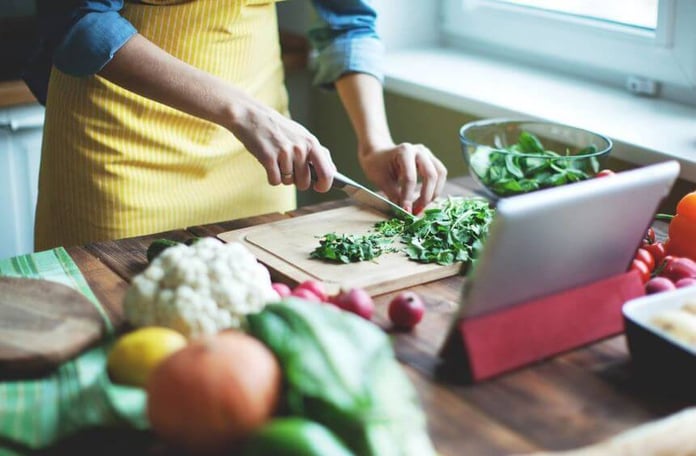
Mannheim / Berlin. They appear on Instagram and Youtube and there is nothing else you can do but watch it: baking and cooking videos. It is reassuring to watch others chop and knead – what is the reason, explains nutrition psychologist Bastienne Neumann in an interview.
Ms. Neumann, what was the last dish you cooked?
Bastienne Neumann: I’m more of the type who looks like hell. So I rarely explicitly search for recipes online. On Facebook, however, I often stumble across the special cooking and baking videos from a bird’s eye view, where cooking is supposed to be quick and easy. I get stuck there.
Why are we so fascinated by cooking and baking videos?
Neumann: Cooking, in general, has a very calming effect and is also used in therapy, for example, more and more often for depression. You are focused and the patience is trained. This mindfulness is a kind of therapeutic tool. When we watch other people cook, it has a similar effect to when you cook yourself. Because the emotions and memories that we associate with cooking still come up – similar to the feelings that arise when leafing through a photo album.
Can food also calm us down?
Neumann: Clearly. Food itself is instinctively linked to the fact that we are not in need. In a stressful situation, the hormone cortisol is released. This activates our brain stem, where our primary instincts reside and are designed to ensure our survival. That is why we eat frequently in stressful situations because it calms us down and gives us the feeling that we are safe. If we prepare food, it will be amplified even more.
Do we eat differently in the Corona crisis?
Neumann: The mechanism of stress eating is more extreme. People stress themselves, are worried, and that’s why they eat more often. Because it calms them down. Besides, we now spend a lot more time in our own four walls. The daily structures we had outside – lunch at 1 p.m. with our colleagues – no longer exist. And the refrigerator is also permanently accessible. I think that many are happy that they finally have time and take the saucepan in their hands more often. The crisis now is also an opportunity for cooking – it becomes part of a return to ourselves.
Videos that are only a few minutes long have become established on social media. How so?
Neumann: Because they fit perfectly into our current fast-paced everyday life. We simply don’t have time for something to burn us. All eventualities – crying while cutting onions or that the cream falls on the floor and we have to go and buy a new pack – cannot be seen in the short formats at all. The videos are very embellished. We are pleased to see how smoothly life can go. I would even say that these videos are consumed without being cooked. Because the discrepancy between what you see and what you have to muster is so great.
How ideological has food become?
Neumann: In the past, you would have to eat what ends up on your plate. Today we have the luxury of expressing ourselves through food. It almost serves to create identity. In the minds of many people, certain nutritional styles are associated with other properties: The vegan is committed to animal welfare and is environmentally conscious. And many carry the expression of lifestyle through nutrition as a kind of sign in front of them: you are what you eat.
Doesn’t this increase the pressure for self-optimization?
Neumann: Definitely. Nutrition is now something everyone looks at. What do the others think when I order this dish? One can be restricted by the “pressure made”. And that means that people want to keep optimizing. This can go so far that you collapse under the pressure to perform and become depressed.
Do the beautiful cooking videos increase the pressure to be perfect?
Neumann: It’s like videos from great athletes: the perfect pictures can be motivating for some users and inspire them to imitate them. Others, on the other hand, feel press by this – but fortunately, there is a Deabonnier button on all social media! You should always ask yourself whether doing what you are doing is good for you – if not, subscribe!
What is the chance that the videos will be re-cooked by well-known YouTubers like Sally?
Neumann: With someone like Sally, the chances are higher because we see ourselves more on the same level as her because of the personal closeness. But the effect of cooking videos certainly has its limits. One reason is our daily routine – in non-corona times – which means that we cook less and less. Cooking is slowly dying out.
For example, I live in Berlin, there is takeaway food on every corner for little money, hardly any of my friends cook anymore.
What will be lost if we no longer cook ourselves?
Neumann: Above all, the appreciation for the food. Lovingly choosing the gents that hold groceries in hand, knowing what my dish is all about in the end, including time and love – this means that we eat much more consciously afterward. If instead we buy something for four euros on the corner and eat it while standing at the bus stop – we no longer notice hunger and satiety. As a result, we eat more and build an unhealthy relationship with food. Without appreciation, food is only a means to an end.
What inspires you?
Neumann: I spent three months in Asia and now I want to cook the delicious dishes that I ate there. Such a nice curry, for example, I’m going to google for a recipe for that – and maybe come across a suitable cooking video. © Mannheimer Morgen, Thursday, April 9th, 2020










